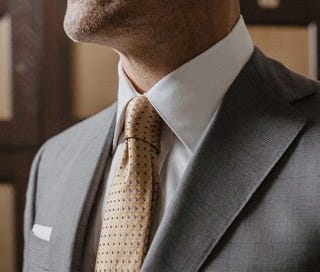Many have pointed out that “aesthetics precedes politics” — an individual’s aesthetic proclivities will push him in the direction of a particular political frame. The channels of the Dissident Right are full of discussion surrounding architecture, cinematography, car design and color, even the aesthetic of stories. Recognition of this axiom on the Left is at the root of their “underdog” aesthetic, and in their rejection of beauty as a hierarchical heresy — more on this later. While the beauty of buildings and paintings can provide insight into the values and health of a wider society, so too does the personal aesthetic of the individuals engaged in that society. Any group or movement is defined by its members. As such, the importance of the members’ beauty is of high importance, equal to the importance of the structures they aspire to build.
Don’t worry, I’m not about to start physique posting; I wouldn’t dare step on the Vitalists’ toes. No, this article is about the way we dress and why you, dear reader, should pay close attention to the manner in which you present yourself to others. More specifically, we’re going to take a gander at the metaphysical aspects of the way you dress. Before that, though, we have to take a moment to address the metaphysics of aesthetic in general and why the Left, in general, hates beauty and loves ugliness. Take a look at this meme posted by the Progressive Libertarians over at Project Liberal:
Okay, maybe it’s a little rude to characterize someone in a way he wouldn’t characterize himself. Project Liberal describe themselves as “true liberalism,” but they seem to have all the ideas of Progressives, the love for the state akin to Neo-Liberals, and the economics of anarcho-capitalists. “Schizophrenic” may be a little on-the-nose here. Either way, the above meme they so proudly shared with the world demonstrates one of the main tenets of their ideology: the love of the ugly. We all know the word fascist to these people means “someone I don’t like.” In their minds, people who see ugliness as something to be reduced or replaced with beauty are bad. How can this be? Surely, everyone loves looking at beautiful things. Well, unless you’re unwilling to take on the challenge of producing beauty yourself.
Again, maybe I’m being too harsh. If we’re drilling down to the metaphysical core of the Left’s embrace of ugliness, it is as an extension of their rejection of hierarchy. Beauty is one of the many natural hierarchies of the world. Like richer and poorer, smarter and dumber, stronger and weaker, there exists a wide gulf between beauty and ugliness that humans recognize in a hierarchical form. Incidentally, richer, smarter, stronger, and more beautiful all seem to go together. Either way, the Left’s rejection of beauty means we on the DR can take it up with ease. It has never been easier to look better than our opponents.
Social aesthetics are the expression of the soul of the society. It is trite to say that architecture and art have metaphysical qualities that affect the viewer, but this does not make it untrue. The soaring heights of our buildings, the colors and emotional gravitas of our paintings, and the cleanliness of our streets all reveal higher qualities that exist beyond the mere physicality of those things. They can serve to inspire or depress us, make us hope or despair, and tell us whether or not the things we see, and the society that produced them, are worth fighting for. We are right to take up the cause of beauty for ourselves and make it a part of our foundational ethos.
The questions of societal aesthetics aside, we need to focus as much on our personal aesthetic as we do the things we wish to see in the external world. Why does this matter? Surely, the truth of our message should be more than the individual speaking those truths. I don’t imagine anyone reading these words is truly naïve enough to believe that. Most of you have already heard of the “halo effect” whereby more beautiful people are seen as more competent, more trustworthy, and more intelligent simply by virtue of their attractiveness. All this to say, outward appearance conveys deep meaning, so much so that the Left expends great effort to devalue it. A beautiful face suggests genetic fitness, a beautiful building conveys societal health, and an individual’s dress gives us a glimpse into the person’s soul.
A very close friend of mine is a director in a medium-large technology firm and does quite a bit of interviewing for very technical roles. For him, one of the most important things in an applicant is his manner of dress. Why should this be? In a technical field, one may expect that credentials are all that matter. While things like certifications certainly matter, a man’s ability to dress well conveys far more than his simple ability to pass a course. Did the applicant bother to wear a suit? Did he iron his undershirt? Did he style up a bit with a pocket square or a tie bar? Does he understand attention to detail? Did he care to put effort in? Take a look at this picture and scrutinize the way the presenter is dressed:
One could imagine the speaker at this podium is a young man, perhaps in his teen years, addressing his fellow students for a class project. While the blue on blue is a classic, mixing formal with casual (the workman’s belt, the badly wrinkled khakis, and the sneakers) that starkly is extremely poor form. Pro tip for anyone looking to dress well: the only time you should be wearing trainers is when you’re training. What immediately jumps out is that this is an individual who understands that he’s supposed to dress well, but doesn’t understand how to do it. In other words, this is an individual who didn’t bother to put in the effort, or care about the details, and decided it didn’t matter whether he even looked good for his captive audience. It displays a lack of social grace and consideration. Is this someone you would take seriously as a grown adult?
No one is surprised that James “Global Atheistic Technocrats Are Actually Just Catholic Distributists” Lindsay doesn’t have the capacity to differentiate even the starkest of opposing details when he can’t even discern classic, timeless rules of dress. Do not be this guy. The perception of your ideas is based on the perception of who you are as a man. This is why anonymity can help the growth of ideas for some, but that is another topic. Our outward appearance is the most effective way we can cultivate our public perception, and the only one that is entirely within our control. The way that we dress, the way we groom, the exercise we do (or don’t), and the way we carry ourselves all have profound, rippling effects that feed back onto themselves and perpetuate aggrandizement or debasement.
Humans in general use heuristics when interacting with others, especially when it comes to things like power and social hierarchy, to bypass the lengthy process of gathering proper information; stereotypes are real. The same friend mentioned above tells a story of his return to the USA from a trip abroad. He landed at an extremely busy airport and was amused to see the outrageous length of the “non-citizen” customs line but was significantly less mirthful when he discovered the “citizen” line was equally as long. There was a third line that only had about four people waiting in it: “diplomats and air crew only.” It wasn’t long after he decided against lining up behind the plebs that a TSA agent came by and asked him, “Are you supposed to be in this line?” He removed his headphone, looked at her lazily, and just said, “Yes.” This was good enough for her, and within a few minutes the customs agent was saying, “Welcome home.”
This worked because my friend knows how to dress. He was wearing a well-fitting blue suit with a presidential pocket square while flying. In no world would he have gotten away with that had he been wearing jeans and a T-shirt or sweatpants. When we choose how we dress, we are choosing a message. Like it or not, that message changes the way others interact with us. The way others interact with us changes the way we view ourselves; changes the way we view them; changes the way we act. This can bring our confidence soaring, our testosterone pumping, or subject us to trembling waves of cortisol. When we wear a suit, are well-groomed, and have good posture we are capable of radiating power. People love power, they love being around it, they listen to power, and they allow themselves to be influenced by those who have it. With a single glance a person should know what sort of man you are because you chose what sort of man to show him.
Contrast this image of Daniel Penny to that of James Lindsay: Mr. Penny is doing a perp walk while Lindsay is standing at a podium in front of a crowd. At a glance, which man is more put together? Which man is cleaner, fitter, more powerful? Which man will be taken more seriously? It doesn’t matter that one is delivering his “ideas” to a crowd while the other is being charged with a crime; one man clearly has aesthetics on his side — for most, that’s enough.
Those of us on the Right have a duty to maximize our personal beauty, as we are the representatives of our ideas and our movement. We believe in order, structure, beauty, and hierarchy, all of which are projected through us by our dress. A well-fitted suit will have a straight line from the shoulder to the shoe, will be clean and symmetrical, and will have a structure that accentuates the shoulders and the chest. Far from being a mere status symbol, it is literally a symbol of the proper ordering of the world in microcosm. It also shows the world that we are serious, that we put in the effort, and that this isn’t merely some fleeting fancy we are engaging in for entertainment. Remember: a belief that isn’t acted upon is no different from a belief not held. Wear your values on your sleeve — as a sleeve — and they will become manifest.









I would argue an alternative to the dress smart vibe of the piece is to make it look intentional. Not everyone wears a suit, and nor is it appropriate. In my field you'll struggle in interviews suited and booted.
But it should look intentional. Here the ladies have the edge, and the best of them can make one good quality dress work as formal wear or casual depending on accessories.
Men can do something similar. The key is quality. Pay for good footwear, good jackets and coats. Better quality shirts and even tshirts if that is what you wear. Make it all look like it goes together.
Politics is an aesthetic choice